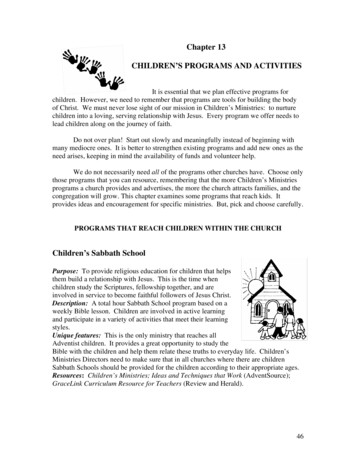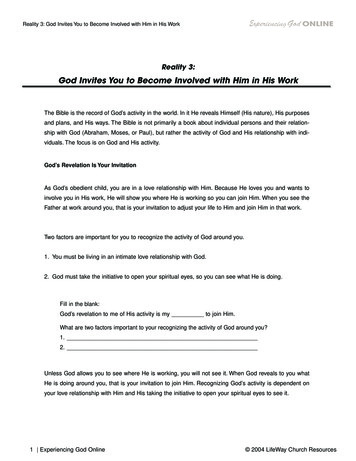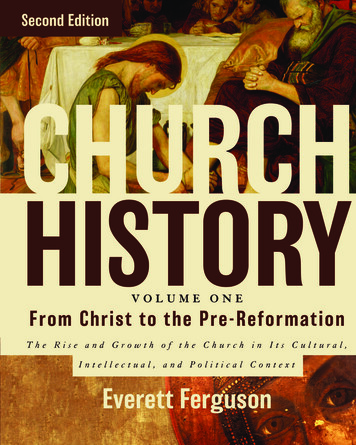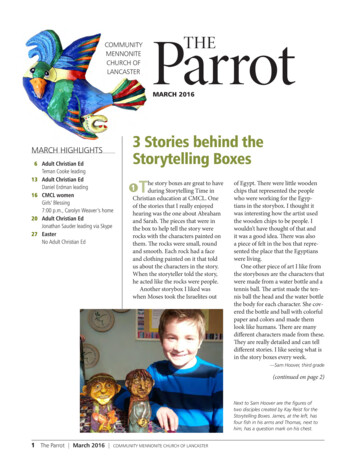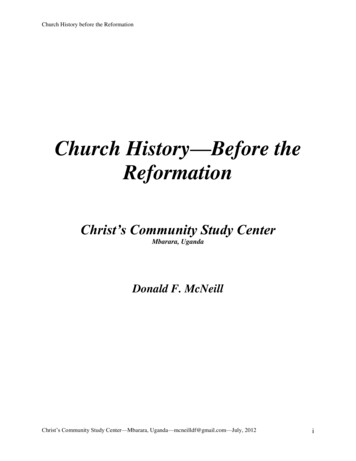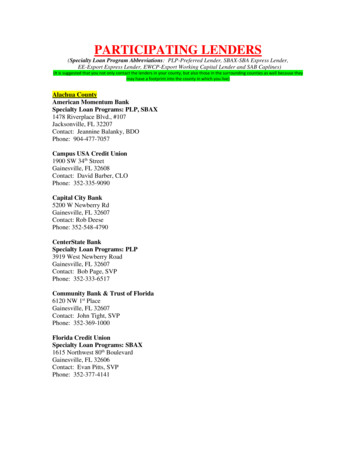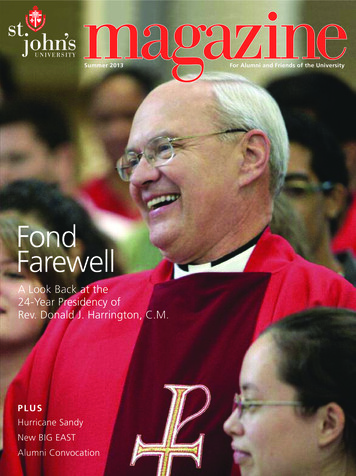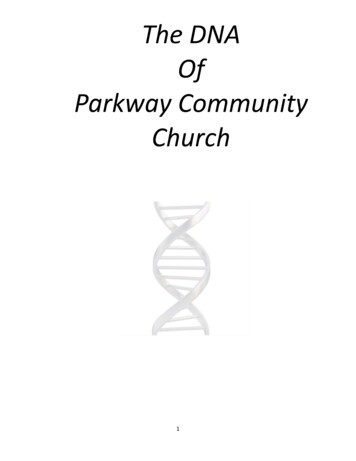
Transcription
TheDNAOfParkwayCommunityChurch1
DNA 1: Christ-CenteredJohn 1:14-18D.L. DeckardApril 25, 2010In what follows, we begin a five-part series on the DNA of the church. Most of us are atleast marginally familiar with the concept of DNA - genetic information that we carry within ourcells that determine our physical features and so forth. It’s what makes us who we arephysically. I think the idea of DNA is a good way of talking about the core factors of whatmakes a church a church. Think about it for a moment, what are the spiritual genetics that makeus Christian? What are the non-negotiable realities that grow us and form us into who God hasmade us and redeemed us to be?If you go to Starbucks, for example, you can get a sense of the DNA of theorganization without ever reading about their core values or philosophy. You know, for example,that you’re always going to see a logo with a half-naked mermaid on it. You’ll walk in and findthe same three sizes of drink – Tall, Grande, and Venti. You never order a “large” unless youwant to look unsophisticated – “Venti” sounds so posh. Everyone is wearing the same greenaprons. They sell the same types of coffee and the same promotional CD’s. The coffee will tastethe same whether you buy a cup in Fairfield or London. So, part of the DNA of Starbucks is acommitment to consistency. You’ll also hear trendy music. You’ll rarely hear classical becausethat’s not part of its DNA. You have to go to Peet’s to hear the sultry sounds of classical music.So another DNA factor is maintaining a “hip” feel. You would also see information on variousitems that would give you the impression that part of the Starbucks DNA is a high regard for theenvironment. In other words, there are certain DNA factors that make Starbucks what it is. TheDNA reflects the imbedded convictions that make a person or organization tick. And knowingthem is important. Knowing them allows for self-evaluation, consistency and focus. Theyfunction to define who you are but they also serve to keep you on track. That’s how importantknowing the DNA is.The question I would like to raise and answer in these four messages is, “What arethe central, controlling DNA factors of the church according to the Scripture.” What shoulddefine every church that calls itself Christian? And note that I use the word should because I’mconvinced that there’s a lot of confusion about what it means at a core level to be the church ofChrist. Ask yourself the question; “What should be present in every Christian church to be ahealthy, functioning church according to the Bible? You could ask the question individually aswell, “What core factors should mark my life?” I wonder if I was to walk around with amicrophone and ask, “In one minute or less tell me what are the core things that must define thechurch,” I wonder how many could answer correctly? Of course you could give the Sundayschool answer and say, “Jesus?” - which of course is true in one sense - but it doesn’t give usenough definition.So for the sake of clarifying, understanding, and most importantly driving this DNA intothe soul of our church, we’re going to consider them. That’s what DNA should do: live andbreathe in each and every believer, and in each and every ministry from Sunday school to “D2
group,” from corporate worship to private worship, from men’s ministry to women’s ministryfrom grief programs to tutoring outreaches.This morning we come to the first of the four. The first thing that should radiate andreverberate in the church is a drive to delight in and declare the glory of Christ. Put differently,the single most important DNA factor that should live and breathe in the consciousness of thechurch is a Christ-centeredness. But notice that there are two dimensions in what was saidabove. We delight and declare inwardly and outwardly, vertically and horizontally, the glory ofChrist. We are to experience his glory and express his glory. This echoes our mission statementto spread a passion for the supremacy of Jesus .” But we won’t declare what we do not delightin. We won’t express a passion until we experience a passion. And since we’re focusing on theheart this year, I’m going to spend our time on the delight part. The main DNA of a healthychurch (and Christian) is a genuine delight in the glory of Christ. That is, we should see in thegathered church the fact that we are crazy about Jesus; consumed with knowing him,experiencing him, savoring him, and enjoying him! A healthy church is obsessed with thegreatness of Christ! That should mark the individual believer as well. It is the most importantgenetic mark of a true Christian – a passion to glory in Christ. Why? Because of who He is.And I can think of no better way to make the point and feed our delight than show it to you inone of the most awe-inspiring passages of the Bible when it comes to establishing the greatnessof Jesus. And you know, the only way for me to increase your desire and passion for him is toshow you more of Him. So that’s what we’re going to do; look at His greatness in John 1:14-18.In these verses we discover why the church has obsessed over Jesus for the last two thousandyears. There we read:14TheWord became flesh and made his dwelling among us. We have seen his glory, the glory of the Oneand Only, who came from the Father, full of grace and truth. 15John testifies concerning him. He cries out,saying, "This was he of whom I said, 'He who comes after me has surpassed me because he was before me.'" 16From the fullness of his grace we have all received one blessing after another. 17For the law was giventhrough Moses; grace and truth came through Jesus Christ. 18No one has ever seen God, but God the Oneand Only, who is at the Father's side, has made him known.In the first part of this chapter (verses 1 ff.), Jesus is introduced with the first words ofGenesis 1:1, “In the beginning was the word .” As such, Jesus is introduced as the EternalWord of God and the Creator of everything. So the writer of the gospel magnifies Jesus’ gloryby associating Him with Genesis 1 and the act of creation. He magnifies His glory again in theverses cited above by associating Jesus to redemption in Exodus 33-34 (which you will soonsee). By doing this he once again magnifies just how massive Jesus is in the scope of biblicalrevelation.I remember the time I first discovered this connection between John 1:14 and Exodus 34.I simply wanted to fall on my knees and worship Christ. So, let me take you back to Exodus33-34 in hopes that the DNA point will be made and your passion increase.The book of Exodus records for us the most significant redemptive event in OldTestament history, namely when God sent Moses to liberate the people of Israel from bondage inEgypt. Through plagues, death, and parting the Red Sea, God brings his people out to meet him3
at Mount Sinai where Moses went up the mountain to receive the Ten Commandments. That’sthe context of Exodus 33-34. Listen, now, to what it says:Exo. 33:9 As Moses went into the tent, the pillar of cloud would come down and stay at the entrance, whilethe LORD spoke with Moses. 10 Whenever the people saw the pillar of cloud standing at the entrance to thetent, they all stood and worshiped, each at the entrance to his tent. 11 The LORD would speak to Moses faceto face, as a man speaks with his friend.Exo. 33:18 Then Moses said, "Now show me your glory."Exo.33:19 And the LORD said, "I will cause all my goodness to pass in front of you, and I will proclaim myname, the LORD, in your presence. I will have mercy on whom I will have mercy, and I will havecompassion on whom I will have compassion. 20 But," he said, "you cannot see my face, for no one may seeme and live."Exo. 33:21 Then the LORD said, "There is a place near me where you may stand on a rock. 22 When myglory passes by, I will put you in a cleft in the rock and cover you with my hand until I have passed by. 23Then I will remove my hand and you will see my back; but my face must not be seen."Chapter 34 records the fulfillment of this request to see the glory of God saying:Exo. 34:4 So Moses chiseled out two stone tablets like the first ones and went up Mount Sinai early in themorning, as the LORD had commanded him; and he carried the two stone tablets in his hands. 5 Then theLORD came down in the cloud and stood there with him and proclaimed his name, the LORD. 6 And hepassed in front of Moses, proclaiming, "The LORD, the LORD, the compassionate and gracious God, slowto anger, abounding in love and faithfulness, 7 maintaining love to thousands, and forgiving wickedness,rebellion and sin.I want you to note in your minds three important things in the passage we just read. Firstis the idea of the tent of meeting. I want you to remember the word tent. It refers to the fact thatGod would come down in the midst of His people and dwell with them in a tent. Moses wouldmeet the Lord there at the tent and speak with him like a friend. It reflects the fact that God’spurpose was to live among His people. Remember the word tent.The second point to be drawn is Moses’ request to see the glory of God. He asks to seethe glory of the Lord. God’s answer is a “No” and a “Yes.” Moses cannot see the face of Goddirectly. He is only given a diminished glimpse of God’s glory passing by. So keep in mind thatMoses (as great as he was) wasn’t allowed to see the glory of God directly. So remember tentand an indirect encounter with God’s glory by Moses.Now the third point to be noticed is the fact that when God’s glory passed by, words werespoken declaring the content of God’s glory. What makes him glorious is not so much theradiant light that passed by, but his radiant character declared that he is compassionate, gracious,loving and faithful. Those last two words are especially important. They serve as the two brightlights of hope throughout the Old Testament – God’s steadfast love (hesed) and his faithfulness.You’ll hear them coupled repeatedly throughout the Old Testament: “Your steadfast love, OLord, extends to the heavens, your faithfulness to the clouds” (Psalm 36:5); or “I give thanks toyour name for your steadfast love and your faithfulness” (Psalm 138:2).So, those three things: tent where God meets, an indirect face to face encounter with theglory of the Lord, and the words that expressed God’s glory, particularly love and faithfulness.Now let’s read John 1:14-18 again:4
John 1:14The Word became flesh and made his dwelling [word literally means to pitch a tent] among us. Wehave seen his glory, the glory of the One and Only, who came from the Father, full of grace and truth.John 1:16From the fullness of his grace we have all received one blessing after another [grace instead ofgrace]. 17For the law was given through Moses; grace and truth came through Jesus Christ. 18No one hasever seen God, but God the One and Only, who is at the Father's side, has made him known.In case you didn’t make the connections, let me draw them out. Just as God pitched atent to meet with his people in Exodus 33, so now God pitches his tent in human flesh. Hecomes to us in the most personal, most understandable, most direct way possible – in humanform. Jesus is the face of God! He is God’s dwelling place with us. That’s why Christiansthrough the centuries have longed for his return because he is the permanent dwelling place ofGod among his people. In Him we see the face of God. That’s the first connection.The second connection is the content of God’s spoken glory! As Moses saw God’s gloryand heard God’s voice declaring His love and faithfulness, so the disciples saw the glory ofGod’s word made flesh full of grace and truth (which are the New Testament equivalents ofsteadfast love and faithfulness in the Old Testament). In other words, Jesus just doesn’t showGod’s faithfulness and love: he IS God’s unswerving faithfulness and gracious love. He is God’slove become flesh. He is God’s faithfulness become flesh. His life shows the glory of God’ssteadfast love and faithfulness by healing the sick, giving sight to the blind, freeing people fromspiritual darkness, and ultimately dying in their place for sin. Jesus is the highest and deepest,the most concrete and tangible expression and fullness of God’s gracious love and enduringfaithfulness the universe will ever see. The point? Jesus is the dwelling place (tent) of God andhe is the fullness of God’s glorious love and faithfulness.The final connection is made in the last verse. “18No one has ever seen God [not Moses,not Isaiah, not Paul], but God the One and Only, who is at the Father's side [Jesus], has made himknown.” John introduces us to someone far greater than Moses who only got to see the backsideof God’s glory. Jesus – “God the One and Only” - is the only one with first-hand, direct accessto the face of God. Why? Because He is God himself! As such, Jesus is the only and ultimaterevealer of God! He is God’s only authorized autobiography of who He, God, really is.So you see, by associating Jesus with Exodus 33-34, John has elevated Jesus to thehighest place possible: the dwelling place of God, the fullness of his glorious love andfaithfulness and the perfect revealer of God. He is the fullness of everything God is! That iswhy every soul that has been awakened to the inexpressible joy of knowing and experiencingChrist is obsessed with Him, crazy about Him, consumed with knowing Him, and hungry toexperience more of Him.He is a solid refuge in times of trouble – as God’s love has always been. To those brokenby failed marriages He is a refuge of comfort. To those weakened by disease He providesstrength to endure. To those discouraged by financial woes He is sufficient to give joy. Forthose burdened by sin He is the Redeemer. For those worried about a world in chaos He is Lordof creation and sovereign King. That’s why any Christian ministry that doesn’t hold Jesus up isfundamentally missing the point. He is the point! But He is more than a refuge for trouble - Heis our treasured reward.5
I pray that in all we do, every ministry, the Lord will graciously imprint this into theDNA of this church! Christ is all! May our greatest compliment from outsiders be, “They arecrazy about Christ!” “They love Christ!” “They can’t stop talking about Christ because he istheir everything.” That, my friends, is the first DNA strand of God’s church. May the Lordmake it so in our lives and in our church. Then, and only then, will spreading a passion for thesupremacy of Jesus Christ be a compulsion, not a duty.DNA 2: Spirit-DependentPhilippians 3:3D.L.DeckardMay 2, 2010As you sit there reading these words, without conscious or willful thought, you arebreathing. Since the first moment you left your mother’s womb you’ve been taking air into yourlungs. And you’ve never stopped. My lungs have been inflating and deflating every moment forthe last four decades. You wouldn’t last but a few minutes without breathing. It reminds me of agame I used to play in the hot tub with my two oldest kids – a game called, “Who can hold his/her breath the longest.” We’d hyperventilate to oxygenate the blood and then go under waterwhile the others counted. We’d never make it very long. I think the longest was two minutes.Much longer and a person would pass out and soon after, die. We depend upon breathing everysecond of the day.That’s not just true of humans but every living thing: bird, mammal, bug, fish, tree orplant. Everything breathes to live – leaves need to breathe, grass needs to breathe, catfish needto breathe. In light of that I find it a stroke of divine genius that when God created the world andall living things, He sent his breath. Genesis 1:2 says, “the Spirit of God was hovering over thewaters.” God’s Spirit was there at the dawn of creation - His Breath! In both ancient languagesof Hebrew and Greek the name Spirit means breath of God. That, I believe, wasn’t an accident.God breathed on a dark and lifeless world and it began to breathe in response. He breathed on alump of clay in Genesis 2 and that formed clay became a living breathing being. When we cometo the New Testament we find that that God’s Breath – His Spirit – comes again through thedeath and resurrection of Jesus to give new birth, new life – eternal life – to dark souls. And justas our physical bodies depend upon breathing to live, so our Christian lives must live moment bymoment in dependence upon the Breath (Spirit) of God.That’s the point of this particular message. The Christian life is about living moment bymoment in and by the Spirit of God. It’s one of the central and crucial DNA factors of thechurch in the Bible. We are to be people who utterly and completely depend on and display thework of the Spirit in our lives. We are to depend upon Him like we breathe – constantly. But6
alas, we often find ourselves depending upon the Spirit sporadically - usually after we’veexhausted our own human strength and control in some crisis or circumstance leaving us helplessand needy. Then we’ll look to the Spirit. Can you imagine taking that approach to physicalbreathing? “I’ll take a breath and go.” Then, when some crisis comes and you find yourselfpanicked, fearful and anxious – like you do when aren’t getting enough air - you take anotherbreath.The point is simple. We are to depend upon the Spirit like we breathe air. That’s what itmeans to be the church. We are to live in and by the Spirit every moment. Now let me do threethings with this main point: ground it in Scripture; apply it to some relevant situations; and givethe primary evidence of it.The Biblical Basis for Depending on the SpiritI realize that for most of you, the fact that we must depend each moment upon the Spiritis a given. I don’t need to prove it to you. However, I would argue that we are in need ofconstant reminders of truth AND need to see that this Spirit-dependence concept is core to ourfaith. It is one of the few prominent DNA factors of the church.So let me take you to Philippians 3:3 where Paul provides a thumbnail summary of theDNA of the church. For sake of flow, I’ll begin in 3:1.Phil. 3:1 Finally, my brothers, rejoice in the Lord! It is no trouble for me to write the same things to youagain, and it is a safeguard for you. 2 Watch out for those dogs, those men who do evil, those mutilators ofthe flesh. 3 For it is we who are the circumcision, we who worship by the Spirit of God, who glory inChrist Jesus, and who put no confidence in the flesh—You’ll notice that verse 3 begins with a basic declaration of who we are as Christians:“we are the circumcision.” It’s a roundabout way of saying that we are God’s people, we are trueJews (to use Paul’s words from Romans) on the basis of our faith. But that declaration of whowe are is then developed in three descriptive clauses. The first mark of the true people – and ourfocus – is that we “worship by the Spirit of God.” The second is that we “glory in Christ Jesus,”which is the DNA factor we considered last week (only in different words: to glory in Christ is todelight in and declare his glory!) The third one runs opposite to the first two insisting that we doNOT trust or depend on human strength. Now let’s back up to the first phrase: “who worship bythe Spirit of God.”When we think of worship we, generally speaking, reduce it down to what happens on aSunday morning – a worship service. While that is an expression of worship, Paul has in mindsomething far more exhaustive and universal in scope. Essentially, when he speaks of worshipof God he is speaking of service to God that encompasses every activity and segment of life.This is clear from other passages by Paul where he says things like, “offer your bodies as livingsacrifices, holy and pleasing to God—this is your spiritual act of worship.” All of you, everymolecule and subatomic particle of your being is to be rendered as worship to him. Or 1Corinthians 10:31, “Whether you eat or drink or whatever you do, do it all for the glory of God.”All of life is to be offered up as joyful service of faith to our God! All-inclusive! The only waythat can be done and must be done is in the strength God supplies – his Spirit, his grace. Andyou know what? The Holy Spirit is more than sufficient for every part of life.7
Listen to a rapid-fire list of all he does according to the New Testament: The Spiritcounsels, teaches and reminds (Jn 14:17); He leads to truth, testifies and makes known (Jn 15:26;16:13, 15); He empowers for mission (Acts 1:8); He guides in decision-making (Acts 10:19;11:12; 13:2, 4); He circumcises the heart (Rom 2:29); He pours love into our hearts (Rom 5:5);He sets free (Rom. 8:2); He raises from the dead (Rom 8:9); He puts sin to death in our lives(Rom 8:13); He intercedes for us (Rom. 8:26); He reveals God to us (1 Cor. 2:10); gives peoplefor ministry (1 Cor. 12); seals us as a guarantee for the future (2 Cor. 1:22); He gives life (2 Cor.3:6); unites the church (2 Cor. 13:14); fellowships with us (2 Cor. 13:14); guarantees our future(2 Cor. 5:5); enables our souls to wait in hope (Gal. 5:5), to conquer the flesh (Gal 5:16), producefruit (Gal 5:22), grow in the knowledge of God (Eph. 1:17). The Spirit fills us with the heart ofChrist (Gal 4:6), fills us (Eph 5:18), sanctifies us (2 Thess. 2:13), helps us (2 Tim. 1:14), renewsus (Tit. 3:5) and proves to us that we are God’s children (1 Jn 3:24). The list could go on.The sheer breadth of all that the Spirit does means that He Himself provides everythingwe need in the moments of life to live to the glory of Christ. Depending completely upon theSpirit of God is what it means to live by grace alone through faith alone.So the fact that one of the central DNA factors of the church is to actually depend uponhim utterly and completely for everything, should be beyond obvious.The Application of Depending on the SpiritNow let me press this truth home in a three different directions largely determined by ourcontemporary culture and circumstance. (That is, they deal with contemporary issues.)The first has to do with the danger of shifting the alignment of dependence. That is to say,one of the great temptations and schemes of the enemy is to subtly, without our even knowing it,shift the basis of our faith from the Spirit of God to something else. And one of the majortemptations (dare I say idolatries) of our day is to shift our dependence from the Spirit of God tothe methods the Spirit may use to carry out His purposes in our lives. The subtle result is that inour inner faith shifts from Spirit to system.What exactly do I mean by this? Some examples may help. First a personal one. One ofthe things I have spent my life learning – in undergraduate, graduate and post graduate – is howto interpret the Bible. It’s called the science of hermeneutics or exegesis. Biblical languages,lower criticism, discourse analysis, genre, syntax and so on. To be clear, learning such things isimportant. The Spirit of God desires us to rightly interpret the word of truth and to train ourminds to do so. These are good things. But it’s easy – so easy – to transfer dependence from theilluminating operation of the Spirit to the manmade science of hermeneutics! I have boweddown to this idle of the human mind and it’s method of interpretation without realizing it.Ultimately, however, what I must ultimately depend upon to guide me to the truth and the properinterpretation of it is the Spirit of God. Not only does He ultimately lead us to truth, but He’s theonly One who can sink knowledge into the bowels of the heart and awaken affections of love,joy, peace and so on.But it is easy to shift your absolute dependence upon the Holy Spirit to the methods ofinterpretation – most of which are human constructions. I know it’s easy because I’ve done itmany times. That’s a shift from depending on the Spirit to depending on a system or method.8
The same kind of thing happens in Christian therapy as well. Can the Spirit use aChristian therapist or counselor to speak into your life and help you grow? Sure! Absolutely!We don’t have enough of them – gifted and devoted to Christ that is. But it’s really easy to shiftyour dependence from the Spirit of God to messenger of God (pastor, counselor or therapist).Your reliance shifts from author of grace to means of grace. And that is idolatry - unhealthy andin the end futile. Yet it’s SO easy to do. It’s so easy for faith to shift from Spirit to system, Godto method.Church leaders do it too. We hear of a church mushrooming in Saddleback and the nextthing you know the method becomes a book, a label, a model - and leaders adopt it in high hopesthat it will work that way in their church as well. Don’t get me wrong! Models of doing thingsare good. But we easily gravitate and glom onto such things trusting (depending) on them towork forgetting that “Unless the LORD builds the house, its builders labor in vain.” Methods aregood but they must never be trusted in. They serve as only means and conduits of the true powerand grace of God. Guard your heart against shifting your dependence on the Spirit to themethod.A related application of this truth has to do with direction and guidance in thecircumstances and decisions of life. We all face decisions in life, some big and some small.What should I do about my children’s education? How do I navigate the waters of this conflict?How do I bring peace to a tumultuous relationship? We are surrounded by decisions that requireguidance. At these times, I believe this truth would require us to seek patiently the leading,guiding and confirmation of the Holy Spirit. The Scripture, of course, is the Spirit’s infallibleguide for life. But the Bible doesn’t tell you who specifically to marry or what ministry youshould participate in. So what do we do?I believe we must depend upon and look to the Spirit of Christ to lead us. To believe thatthe Spirit will provide proper counsel, open and close the right providential doors AND providean inner confirmation of heart that this is the way to go.Many of us, however, bypass this patient dependence upon the Spirit and proceed on theconventional wisdom of men. The problem, of course, with conventional wisdom – leadershipprinciples, for example – is that throughout the Bible God at times called and directed his peopleto do things in an unconventional way – hiking through the Red Sea, choosing the second born asthe inheritor instead of the conventional first-born and, of course, the unconventional method ofsaving people through crucifixion. Conventional wisdom is good, only in so far as it receives thedivine confirmation of the Spirit of God. It must be subordinate to the wisdom from on high.Jim Elliot’s life serves as a good example. He met his future wife Elizabeth in college in1947. But he was resolved not to marry if it would in any way shape or form, compromise hiskingdom ministry as a missionary. The problem was that he fell in love with her. Despite hislove, however, he would not marry her until he knew the Lord was directing him to do it. Sixyears passed until he received the leading of God to marry her. Most of us today don’t depend onthe Spirit for that kind of leading, guiding and confirmation from the Lord before we do things.We see a pretty single girl and think, “She’s a Christian, I’m a Christian, we’re in love, we’reboth single so heck .let’s get hitched.” If we are to depend upon the Spirit in all things, wemust depend upon him to lead, guide and confirm direction for us. I am convinced of this.9
One final application of this truth has to do with our relationships with others. Many ofus, myself included, fall into the trap of thinking that we can change other people. Husbands tryto change wives, wives-husbands, parents-kids, congregants-leaders, leaders-congregants, and soforth. And as a result relationships fly apart because the one party feels pressured andcondemned while the other frustrated and depressed.When will we learn that the one who changes people from the inside out in a way thatdoes not coerce or oppress the will, is the Spirit of God? The soul is his domain. That doesn’tmean we shouldn’t confront, encourage, or inform when needed. But we must always do so withan open hand knowing that the Spirit and the Spirit alone is the only one who can bring lastingchange into a person’s life. We would do well to release people to the work of the Spirit.Believe it or not, life will be much better that way. I think that’s what Paul meant when he saidthat love “always trusts” (1 Cor. 13:7).We must depend upon the Spirit not methods, on the Spirit’s guidance not just theconventional wisdom of men, and must trust Him with changing others. Now let me close withthe primary way this dependence upon the Holy Spirit expresses itself. It expresses itself inprayer. Prayer is the truest measure of one’s dependence upon the Holy Spirit. Where there islittle prayer there is little desperation of soul. Where there is little prayer there is confidence inhuman strength and methods. Where there is little prayer there is little trust in grace.How do we study the Scripture depending upon the Holy Spirit? We pray as we read,“Teach me your truth O Lord.” How do we determine direction in a decision, situation orcircumstance? We pray for guidance and confirmation. And we continue praying waiting forHis guidance and/or confirmation. How do we depend upon the Lord for the life and future ofanother? We lift them up to God and ask Him to do His work of change.But it’s not just the act of praying that displays the dependence upon God it’s thedesperate compulsion to want to pray that reveals a truly dependent heart. It’s the heart that feelsand says, “ we are powerless we do not know what to do, but our eyes are on you” (2 Chron.20:12). Breathing out prayers and dependence upon the Spirit go hand in hand. May ourdependence upon God be like breathing – constant, simple and never-ending.My friends, God has provided everything for us.
the glory of the Lord. God’s answer is a “No” and a “Yes.” Moses cannot see the face of God directly. He is only given a diminished glimpse of God’s glory passing by. So keep in mind that Moses (as great as he was) wasn’t allowed to see the glory of God directly. So remember tent and an indir
